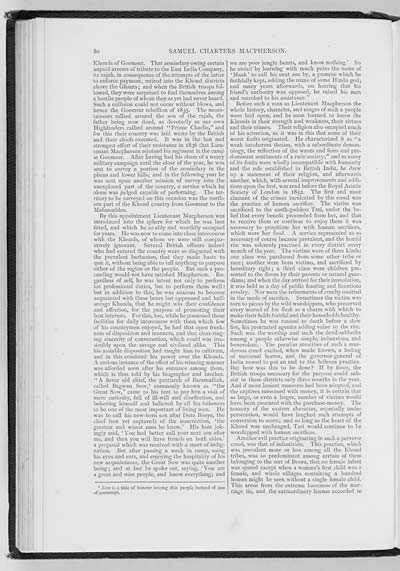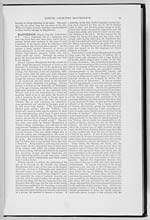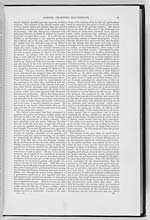80
Khonds of Goomsur. That zemindary owing certain
unpaid arrears of tribute to the East India Company,
its rajah, in consequence of the attempts of the latter
to enforce payment, retired into the Khond districts
above the Ghauts; and when the British troops fol-
lowed, they were surprised to find themselves among
a hostile people of whom they as yet had never heard.
Such a collision could not occur without blows, and
hence the Goomsur rebellion of 1835. The moun-
taineers rallied around the son of the rajah, the
father being now dead, as devotedly as our own
Highlanders rallied around "Prince Charlie," and
for this their country was laid waste by the British
and their chiefs executed. It was in the last and
strongest effort of their resistance in 1836 that Lieu-
tenant Macpherson rejoined his regiment in the camp
at Goomsur. After having had his share of a weary
military campaign until the close of the year, he was
sent to survey a portion of the zemindary in the
plains and lower hills; and in the following year he
was sent upon another mission of survey into the
unexplored part of the country, a service which he
alone was judged capable of performing. The ter-
ritory to be surveyed on this occasion was the north-
ern part of the Khond country from Goomsur to the
Mahanuddee.
By this appointment Lieutenant Macpherson was
introduced into the sphere for which he was best
fitted, and which he so ably and worthily occupied
for years. He was now to come into close intercourse
with the Khonds, of whom we were still compar-
atively ignorant. Several British officers indeed
who had entered the country were so disgusted with
the prevalent barbarism, that they made haste to
quit it, without being able to tell anything to purpose
either of the region or the people. But such a pro-
ceeding would not have satisfied Macpherson. Re-
gardless of self, he was intent not only to perform
his professional duties, but to perform them well:
but in addition to this, he was anxious to become
acquainted with these brave but oppressed and half-
savage Khonds, that he might win their confidence
and affection, for the purpose of promoting their
best interests. For this, too, while he possessed those
facilities for daily intercourse with them which few
of his countrymen enjoyed, he had that open frank-
ness of disposition and manners, and that clear-ring-
ing sincerity of conversation, which could win irre-
sistibly upon the savage and civilized alike. This
his amiable disposition had taught him to cultivate,
and in this consisted his power over the Khonds.
A curious instance of the effect of his winning manner
was afforded soon after his entrance among them,
which is thus told by his biographer and brother.
"A fierce old chief, the patriarch of Baramullick,
called Bagwan Sow,1 commonly known as "the
Great Sow," came to his tent to pay him a visit of
mere curiosity, full of ill-will and disaffection, and
believing himself and believed by all his followers
to be one of the most important of living men. He
was to call his new-born son after Dora Bissye, the
chief (not yet captured) of the insurrection, 'the
greatest and wisest man he knew.' His host jok-
ingly said, * You had better call your next son after
me, and then you will have friends on both sides,'
a proposal which was received with a snort of indig-
nation. But after passing a week in camp, using
his eyes and ears, and enjoying the hospitality of his
new acquaintance, the Great Sow was quite another
being; and at last he spoke out, saying, 'You are
a great and wise people, and know everything; and
1 Sow is a title of honour among this people instead of one
of contempt.
we are poor jungle beasts, and know nothing.' So
he ended by learning with much pains the name of
'Maak' to call his next son by, a promise which he
faithfully kept, adding the name of some Hindu god;
and many years afterwards, on hearing that his
friend's authority was opposed, he raised his men
and marched to his assistance."
Before such a man as Lieutenant Macpherson the
whole history, character, and usages of such a people
were laid open, and he soon learned to know the
Khonds in their strength and weakness, their virtues
and their crimes. Their religion also occupied much
of his attention, as it was in this that some of their
worst faults originated. He characterized it as "a
weak incoherent theism, with a subordinate demon-
ology, the reflection of the wants and fears and pre-
dominant sentiments of a rude society;" and as many
of its fruits were wholly incompatible with humanity
and the rule established in British India, he drew
up a statement of their religion, and afterwards
another, which, with several improvements and addi-
tions upon the first, was read before the Royal Asiatic
Society of London in 1852. The first and most
clamant of the crimes inculcated by this creed was
the practice of human sacrifice. The victim was
sacrificed to the earth-goddess Tari, under the be-
lief that every benefit proceeded from her, and that
to receive them or continue to enjoy them it was
necessary to propitiate her with human sacrifices,
which were her food. A service represented as so
necessary of course became prevalent, and the horrid
rite was solemnly practised in every district every
month of the year. The victims were of three kinds:
one class was purchased from some other tribe or
race; another were born victims, and sacrificed by
hereditary right; a third class were children pre-
sented to the doom by their parents or natural guar-
dians; and when the day arrived for their immolation,
it was held as a day of public feasting and licentious
revelry. Nor were the refinements of cruelty omitted
in the mode of sacrifice. Sometimes the victim was
torn to pieces by the wild worshippers, who preserved
every morsel of his flesh as a charm with which to
make their fields fruitful and their households healthy.
Sometimes he was roasted to death before a slow
fire, his protracted agonies adding value to the rite.
Such was the worship and such the devil-sabbaths
among a people otherwise simple, industrious, and
benevolent. The peculiar atrocities of such a mur-
derous creed excited, when made known, a feeling
of universal horror, and the governor-general of
India vowed to put an end to the hideous practice.
But how was this to be done? If by force, the
British troops necessary for the purpose could sub-
sist in these districts only three months in the year.
And if more lenient measures had been adopted, and
the captives ransomed with money, it is certain that
as large, or even a larger, number of victims would
have been procured with the purchase-money. The
tenacity of the eastern character, especially under
persecution, would have laughed such attempts of
conversion to scorn; and so long as the heart of the
Khond was unchanged, Tari would continue to be
worshipped with human sacrifices.
Another evil practice originating in such a perverse
creed, was that of infanticide. This practice, which
was prevalent more or less among all the Khond
tribes, was so predominant among certain of them
belonging to the sect of Boora, that no female infant
was spared except when a woman's first child was a
female, and whole villages containing a hundred
houses might be seen without a single female child.
This arose from the extreme looseness of the mar-
riage tie, and the extraordinary license accorded to

![]() Universal Viewer |
Universal Viewer | ![]() Mirador |
Large image | Transcription
Mirador |
Large image | Transcription
![]()

